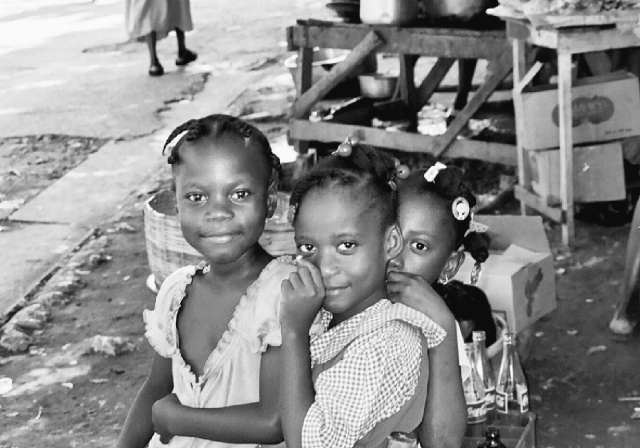
Since the recent suspension of the Peace Corps' Haiti Program, Jason Feldman and 76 other returned volunteers are readjusting to life in America
ABYSMAL POVERTY RULES LIFE IN HAITI
May 16, 2004
Buffalo News
by Jason Feldman
Caption: Haiti is considered one of the most poorly nourished nations in the world, and Haitian children often go to bed hungry. Photo by Jason Feldman
"Whatever may happen of peace or war, Haiti will remain in the firmament of nations, and like the star of the north, will shine on and shine on forever."
-- Frederick Douglass, U.S. Minister and Consul General to Haiti
Since the recent suspension of the Peace Corps' Haiti Program, I and 76 other returned volunteers are readjusting to life in America. As volunteers, we worked on initiatives in sustainable agriculture, community economics and public health. Some of us spent as long as 19 months living and dreaming in the rich oral tradition of Haitian Kreyol.
I lived in Ouanaminthe, the largest and busiest Haitian town on the border of the Dominican Republic. My daily reality was punctuated by stupefying images of contrast and resilience. In rural Haiti, women spend their mornings walking up and down mountains to fill buckets with water.
For decades, Haiti has remained more affected by nutritional deficiency, economic stagnancy and human catastrophe than any other Western Hemisphere nation by far. As much as I painfully wish to say that Haiti is a statistical anomaly today in terms of relative global poverty, I can't -- there are too many other countries around the world where people live like Haitians do, where men and women face life expectancies of 45 and 55.
Without plumbing, most Haitian adults rely on children to retrieve buckets of water from wells. Cooking anything requires first making a fire, for which wood is necessary. Haiti today is said to be 90 percent depleted of its natural forests. Having experienced it recently myself, I know too well that most Haitians go to sleep hungry, children especially.
Haiti is considered one of the most poorly nourished nations in the world, ranking just after Afghanistan and Somalia in its lack of food and incidence of chronic malnutrition -- a plausible estimate of anywhere between 50 and 80 percent of its population.
Watching people prepare food was always interesting. Women would hunch over simmering pots in the shade cutting vegetables, somehow always telling stories and jokes. Barefoot, dirty children never strayed far.
There was never enough food. There was never enough affection for the children. There could never be sufficient time in a day to attend to everybody's infinite work. There was no hope that tomorrow would offer some relief from the monumental challenges of basic survival, that life might one day become easier.
Life in Haiti is hardest for women and children. Plates of food are never really yours after they're brought to you with careful attention not to upset anything in the process. Within a short period of time, I learned that whatever minuscule portion of brown rice and beans that I wasn't going to eat is what made up a young child's meal.
My memories of growing up in suburban Buffalo include late-night carousing with friends. I recall trips to all-night grocery stores, weaving through aisles full of food as the shopping cart wheels sped into U-turns. Afterward, we sat on freshly installed curbs in newly opened residential developments, where the curbs resembled marshmallow frosting along smooth asphalted streets. Under the street lights, we ate sandwiches loaded with mayonnaise and tomatoes.
One interaction I witnessed routinely in Haiti was of the eldest of four sons eating from a plate at a sagging table while he yells for his younger sister, the eldest of four girls, to bring him drinking water. Later, his plate now limited to a pie-shaped mound of rice, he yells for her again. When she reappears, the flicker of a kerosene lamp permeating the room, he orders her to Frape'l; "Hit it!" and hands her the plate. That's her dinner.
In every Haitian family, the youngest children most frequently get less food. International aid only minimally alleviates the huge insufficiency of domestic food production. There is said to be as many as half a million Haitians surviving on humanitarian relief bags of noodles and rice in the northern region alone, where I lived.
Today, the three geographic areas that make up the northern half of the war-torn country are cut off from that aid. Since rebel forces blocked the only north-south arteries, provincial capitals remain under their control. Including the makeup of Haiti's second largest city, this northern region collectively is home to half the nation's burgeoning population. Haiti is slightly smaller in area than Maryland and has nearly 7 million people.
The ensuing starvation silently plays itself out in each passing day. Electricity has been out in Port-au-Prince, the capital, and nonexistent in most other areas, and telephone lines now are down throughout the north. For those of us removed from the turmoil but personally involved from afar, we remember with reverberating tenderness the inspiration we found in our Haitian neighbors.
Jason Feldman graduated from The Park School of Buffalo in 1994. He may be contacted at o_falador@yahoo.com.
